unit12 sectionA课前预习导学案
Unit12_SectionA(1a-1c)精品导学案
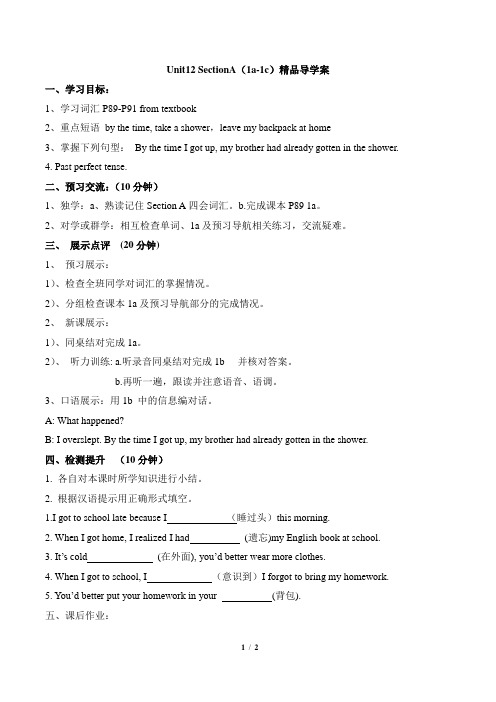
Unit12 SectionA(1a-1c)精品导学案一、学习目标:1、学习词汇P89-P91 from textbook2、重点短语by the time, take a shower,leave my backpack at home3、掌握下列句型:By the time I got up, my brother had already gotten in the shower.4. Past perfect tense.二、预习交流:(10分钟)1、独学:a、熟读记住Section A四会词汇。
b.完成课本P89 1a。
2、对学或群学:相互检查单词、1a及预习导航相关练习,交流疑难。
三、展示点评(20分钟)1、预习展示:1)、检查全班同学对词汇的掌握情况。
2)、分组检查课本1a及预习导航部分的完成情况。
2、新课展示:1)、同桌结对完成1a。
2)、听力训练: a.听录音同桌结对完成1b 并核对答案。
b.再听一遍,跟读并注意语音、语调。
3、口语展示:用1b 中的信息编对话。
A: What happened?B: I overslept. By the time I got up, my brother had already gotten in the shower.四、检测提升(10分钟)1. 各自对本课时所学知识进行小结。
2. 根据汉语提示用正确形式填空。
1.I got to school late because I (睡过头)this morning.2. When I got home, I realized I had (遗忘)my English book at school.3. It’s cold(在外面), you’d better wear more clothes.4. When I got to school, I (意识到)I forgot to bring my homework.5. You’d better put your homework in your (背包).五、课后作业:________________________________________________________________________六、课后反思:(Teachers/Students)________________________________________________________________________________________________________________________________________________________________________________________________________________________________ _________________________________________________________________________________ _________________________________________________________________________________ ____________________________________________。
人教版七年级英语下册 Unit12 Section A(1a-2d)预习-训练案

I worked as a guide at the Natural 3.我在自然历史博物馆当导游了。
History Museum.
4.我熬夜看足球比赛了。
I stayed up late to watch 用以上重点短语和句型完成下列句子。
1.我们昨天去划船了。 We ___w_e_n_t_b_o_a_t_i_n_g_____yesterday. 2.我和朋友们正在体育中心打羽毛球。
5.打羽毛球___p_la_y__b_a_d_m__in_t_o_n__ 6.复习考试__s_tu_d_y__f_o_r_t_h_e_t_e_st__
7.告诉某人关于某事__te_l_l_s_b_. _a_b_o_u_t_sth.
8.生活习惯__l_iv_i_n_g_h_a_b__it___
9.有几分___k_i_n_d__o_f__________
三、完成句子,词数不限。 16.保罗昨晚复习准备英语考试。 Paul __s_t_u_d_ie_d__f_o_r_a_n_/_th_e__E_n_g_l_is_h__te_s_t___last night. 17.你上个周末去划船了吗? ____D__id__________ you __g_o_b_o_a_t_i_n_g________ last weekend?
( B )7.—Where did you go last summer holiday? —I ________ to the Palace Museum.
A.go B.went C.am going D.goes
( A )8.We played badminton ________ Sunday afternoon.
A.camp
B.camps C.camping D.camped
Unit12SectionA(3a-3c)教案2023-2024学年人教版九年级英语全册
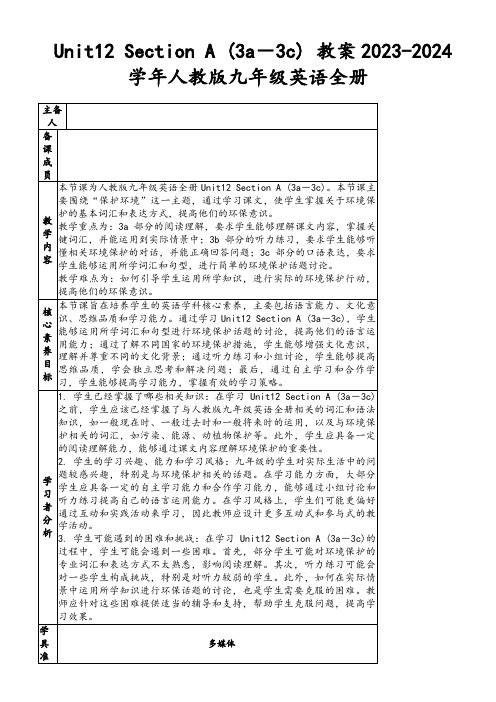
2. 学生的学习兴趣、能力和学习风格:九年级的学生对实际生活中的问题较感兴趣,特别是与环境保护相关的话题。在学习能力方面,大部分学生应具备一定的自主学习能力和合作学习能力,能够通过小组讨论和听力练习提高自己的语言运用能力。在学习风格上,学生们可能更偏好通过互动和实践活动来学习,因此教师应设计更多互动式和参与式的教学活动。
- 观看环保纪录片:建议学生观看关于环境保护的纪录片,了解地球生态环境的现状,增强环保意识。
- 阅读环保文章:鼓励学生阅读关于环境保护的文章,思考人类与自然的关系,培养学生的环保思维。
- 玩环保互动游戏:推荐学生玩一些关于环境保护的互动游戏,巩固所学知识,提高学生的环保素养。
课后作业
1. 请用英语描述一种你认为最重要的环保措施,并解释为什么你认为它是重要的。
3. 实验器材:如果本节课需要进行实验,确保实验器材的完整性和安全性。例如,如果进行垃圾分类的实验,需要准备不同类型的垃圾容器和分类标签,以及相关的实验指导资料。
4. 教室布置:根据教学需要,布置教室环境,以创造一个有利于学习的氛围。例如,可以根据小组讨论和实验操作的需要,将教室布置成分组讨论区和实验操作台。在分组讨论区,可以设置一些舒适的座椅和桌子,以便学生进行小组讨论和合作学习;在实验操作台,可以准备一些实验器材和实验指导资料,以便学生进行实验操作和观察。
人教版英语9年级全册Unit12_SectionA(1a-2d)教案
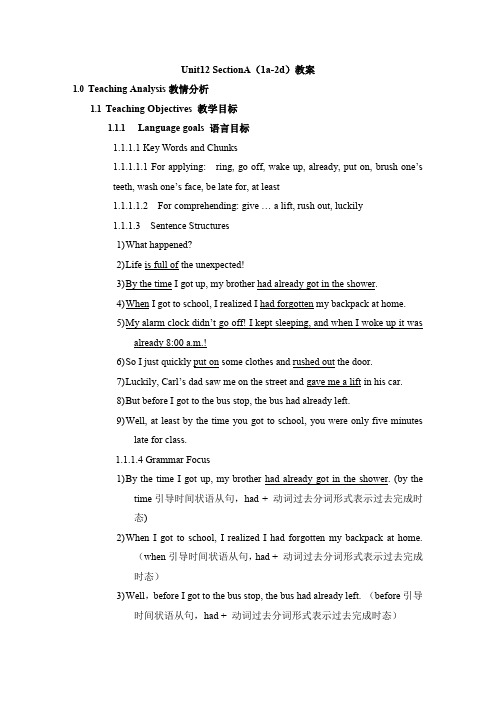
Unit12 SectionA(1a-2d)教案1.0Teaching Analysis教情分析1.1Teaching Objectives 教学目标1.1.1Language goals 语言目标1.1.1.1 Key Words and Chunks1.1.1.1.1 For applying: ring, go off, wake up, already, put on, brush one’steeth, wash one’s face, be late for, at least1.1.1.1.2 For comprehending: give … a lift, rush out, luckily1.1.1.3 Sentence Structures1)W hat happened?2)L ife is full of the unexpected!3)B y the time I got up, my brother had already got in the shower.4)W hen I got to school, I realized I had forgotten my backpack at home.5)M y alarm clock didn’t go off! I kept sleeping, and when I woke up it wasalready 8:00 a.m.!6)S o I just quickly put on some clothes and rushed out the door.7)L uckily, Carl’s dad saw me on the street and gave me a lift in his car.8)B ut before I got to the bus stop, the bus had already left.9)W ell, at least by the time you got to school, you were only five minuteslate for class.1.1.1.4 Grammar Focus1)B y the time I got up, my brother had already got in the shower. (by thetime引导时间状语从句,had + 动词过去分词形式表示过去完成时态)2)W hen I got to school, I realized I had forgotten my backpack at home.(when引导时间状语从句,had + 动词过去分词形式表示过去完成时态)3)W ell,before I got to the bus stop, the bus had already left. (before引导时间状语从句,had + 动词过去分词形式表示过去完成时态)1.1.2Ability goals 能力目标1.1.2.1 学会用when/ by the time引导时间状语从句,用“had+动词过去分词形式”谈论过去的事情。
人教版英语七年级下册Unit 12 Section A(2d-3c)导学案

Unit 12 Section A〔2d-3c〕导学案【课型】对话表演和语法课【学习目标】1. 通过2d的对话表演,领会一般过去时在具体语境中运用并熟练掌握目标语言:I worked as a guide at the Natural History Museum. I told the visitors about them and their living habits. I stayed up late to watch the soccer game.2. 通过语法表格,能更深入地理解一般过去时态的特殊疑问句的变化规律。
3. 3a(关注语言形式),3b〔关注语言意义〕和3c(关主口头交际)的逐级训练,能熟练地正确地运用过去时态的各种不同句式。
【自主学习】一、预习交流〔1〕根据Grammar Focus,归纳Section A局部语法重点。
〔2〕自学2d,勾画出重点和疑惑。
二、英汉互译(1)自然历史博物馆(2)生活习性(3)担当(4) tell about(5) kind of tired (6) stay up late【新课导入】Step l: Lead-in1. Greetings教师和学生互动交流周末怎么样,做了什么。
根据实际情况可用不同的活动短语,用得越多越好。
T: How was your weekend?S: It was great.T: What did you do?S: I fed some sheep....2. 两两对话。
Look at the pictures and talk about the weekendA: How was your weekend?B: It was great /OK /not bad/not very good...A: What did you do last weekend?B: ...【新知呈现】Step 2: Presentation1. 看图片,Lisa和Paul 正在谈论他们的周末活动。
八年级英语上册Unit 12 What’s the best radio station__Section A导学案人教新目标版

Unit 12 What’s the best radio station?Section A3a—4一、课前检测1.复习检测:Finish off the dialogue.A: What is the best movie theater?B:____________________________A:____________________________B: Because it has the most comfortable seats.A:____________________________B: No ,it isn’t. But it is the cheapest.1)Is the screen very big?2)Town Center Theater is the best.3)Why is it the best theater?2.预习检测:Translate the words or phrases(翻译单词或短语)便宜货________一餐________最坏的_________更坏的_______自在的________荧屏_________座位__________舒适的________最有趣的_______做调查______认为__________无论怎样______二、学习目标1.熟练掌握本课单词和短语。
2.学会运用形容词的最高级表达最喜爱的事物。
3.能够掌握3a 中的重点句型并能复述3a.三、学习过程1.Talk about your favorite places in town .(小组讨论)2.Read 3a and choose the best answers;1)Which movie theater is the best?A. the Jason’sB. the Screen City2)Which movie theater is the cheapest 、A.Town Cinema B. Jason’s3. Read again to fill in the chart .4. Read for the third time .Find out phrases and expressions;1)What do ….think about….?(What do…..think of…?)2)do a survey of…3)however =no matter how 4)the best quality clothing5)the most interesting music 6)the most popular clothing store5.巩固练习:据汉语完成句子1)这是我们调查的结果。
人教版英语七年级下册:(Unit 12)Section A(1a~2d)【教案】
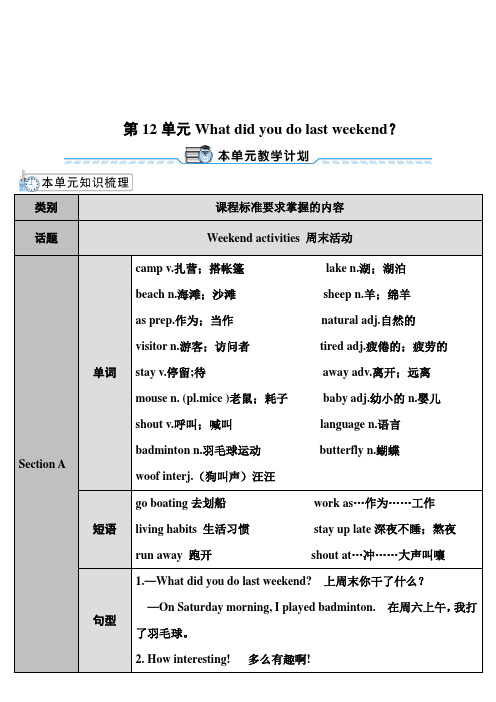
第12单元What did you do last weekend ?类别课程标准要求掌握的内容话题Weekend activities 周末活动Section A 单词camp v.扎营;搭帐篷lake n.湖;湖泊beach n.海滩;沙滩sheep n.羊;绵羊as prep.作为;当作natural adj.自然的visitor n.游客;访问者tired adj.疲倦的;疲劳的stay v.停留;待away adv.离开;远离mouse n. (pl.mice )老鼠;耗子baby adj.幼小的n.婴儿shout v.呼叫;喊叫language n.语言badminton n.羽毛球运动butterfly n.蝴蝶woof interj.(狗叫声)汪汪短语go boating去划船work as…作为……工作living habits 生活习惯stay up late深夜不睡;熬夜run away 跑开shout at…冲……大声叫嚷句型1.—What did you do last weekend? 上周末你干了什么?—On Saturday morning, I played badminton. 在周六上午,我打了羽毛球。
2. How interesting! 多么有趣啊!句型1. I was so tired that I went to sleep early. 我是如此疲劳以至于早早地去睡觉了。
2. We saw a big snake sleeping near the fire. 我们看见一条大蛇正在篝火旁边睡觉。
3. My dad told me later that snakes don’t have ears but can feel things moving. 我的爸爸后来告诉我蛇没有耳朵但能感知东西在移动。
语法一般过去时(二)写作描述周末活动知识目标一般过去时态(Ⅱ)能力目标掌握一般过去时态的各种句式变化;运用过去时态谈论过去发生的事情;能够用日记的形式记录一天的活动并表达感想。
小学英语Lesson12教案课前预习指导
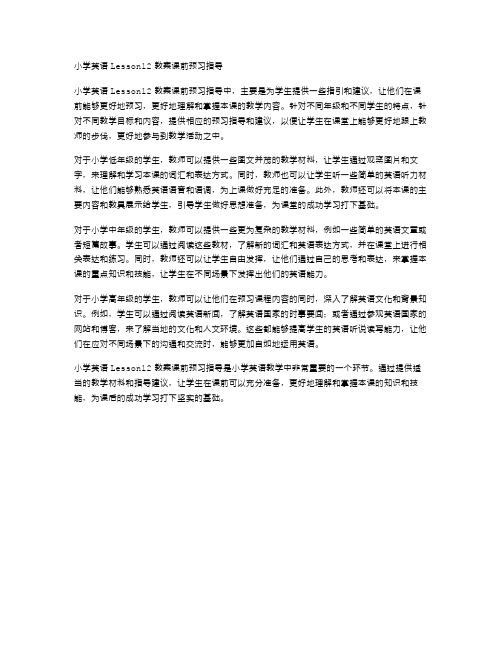
小学英语Lesson12教案课前预习指导小学英语Lesson12教案课前预习指导中,主要是为学生提供一些指引和建议,让他们在课前能够更好地预习,更好地理解和掌握本课的教学内容。
针对不同年级和不同学生的特点,针对不同教学目标和内容,提供相应的预习指导和建议,以便让学生在课堂上能够更好地跟上教师的步伐,更好地参与到教学活动之中。
对于小学低年级的学生,教师可以提供一些图文并茂的教学材料,让学生通过观察图片和文字,来理解和学习本课的词汇和表达方式。
同时,教师也可以让学生听一些简单的英语听力材料,让他们能够熟悉英语语音和语调,为上课做好充足的准备。
此外,教师还可以将本课的主要内容和教具展示给学生,引导学生做好思想准备,为课堂的成功学习打下基础。
对于小学中年级的学生,教师可以提供一些更为复杂的教学材料,例如一些简单的英语文章或者短篇故事。
学生可以通过阅读这些教材,了解新的词汇和英语表达方式,并在课堂上进行相关表达和练习。
同时,教师还可以让学生自由发挥,让他们通过自己的思考和表达,来掌握本课的重点知识和技能,让学生在不同场景下发挥出他们的英语能力。
对于小学高年级的学生,教师可以让他们在预习课程内容的同时,深入了解英语文化和背景知识。
例如,学生可以通过阅读英语新闻,了解英语国家的时事要闻;或者通过参观英语国家的网站和博客,来了解当地的文化和人文环境。
这些都能够提高学生的英语听说读写能力,让他们在应对不同场景下的沟通和交流时,能够更加自如地运用英语。
小学英语Lesson12教案课前预习指导是小学英语教学中非常重要的一个环节。
通过提供适当的教学材料和指导建议,让学生在课前可以充分准备,更好地理解和掌握本课的知识和技能,为课后的成功学习打下坚实的基础。
七年级英语下册 Unit12 Don’t eat in class导学案(无答案) 人教新目标版
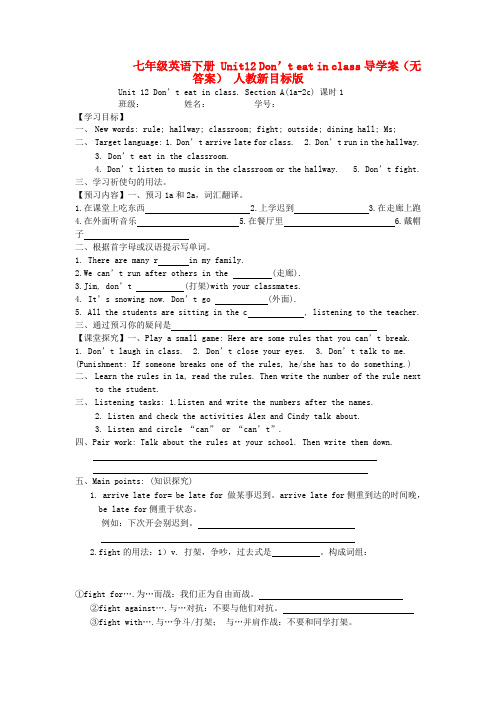
七年级英语下册 Unit12 Don’t eat in class导学案(无答案)人教新目标版Unit 12 Don’t eat in class. Section A(1a-2c) 课时1班级:姓名:学号:【学习目标】一、New words: rule; hallway; classroom; fight; outside; dining hall; Ms;二、Target language: 1. Don’t arrive late for class. 2. Don’t run in the hallway.3. Don’t eat in the classroom.4. Don’t listen to music in the classroom or the hallway.5. Don’t fight.三、学习祈使句的用法。
【预习内容】一、预习1a和2a,词汇翻译。
1.在课堂上吃东西2.上学迟到3.在走廊上跑4.在外面听音乐5.在餐厅里6.戴帽子二、根据首字母或汉语提示写单词。
1. There are many r in my family.2.We can’t run after others in the (走廊).3.Jim, don’t (打架)with your classmates.4. It’s snowing now. Don’t go (外面).5. All the students are sitting in the c , listening to the teacher.三、通过预习你的疑问是【课堂探究】一、Play a small game: Here are some rules that you can’t break.1. Do n’t laugh in class.2. Don’t close your eyes.3. Don’t talk to me. (Punishment: If someone breaks one of the rules, he/she has to do something.) 二、Learn the rules in 1a, read the rules. Then write the number of the rule nextto the student.三、Listening tasks: 1.Listen and write the numbers after the names.2. Listen and check the activities Alex and Cindy talk about.3. Listen and circle “can” or “can’t”.四、Pair work: Talk about the rules at your school. Then write them down.五、Main points: (知识探究)1. arrive late for= be late for 做某事迟到。
新目标七年级下册Unit12 Don’t eat in class.学案
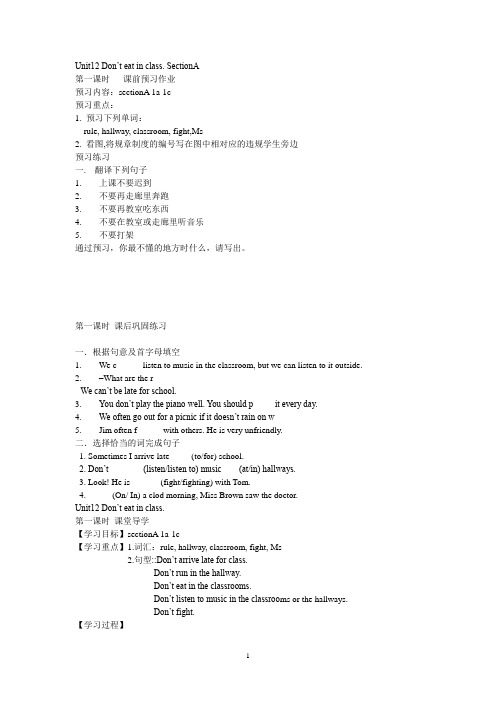
Unit12 Don’t eat in class. SectionA第一课时课前预习作业预习内容:sectionA 1a-1c预习重点:1. 预习下列单词:rule, hallway, classroom, fight,Ms2. 看图,将规章制度的编号写在图中相对应的违规学生旁边预习练习一. 翻译下列句子1. 上课不要迟到2. 不要再走廊里奔跑3. 不要再教室吃东西4. 不要在教室或走廊里听音乐5. 不要打架通过预习,你最不懂的地方时什么,请写出。
第一课时课后巩固练习一.根据句意及首字母填空1. We c listen to music in the classroom, but we can listen to it outside.2. –What are the r--We can’t be late for school.3. You don’t play the piano well. You should p it every day.4. We often go out for a picnic if it doesn’t rain on w5. Jim often f with others. He is very unfriendly.二.选择恰当的词完成句子1. Sometimes I arrive late (to/for) school.2. Don’t (listen/listen to) music (at/in) hallways.3. Look! He is (fight/fighting) with Tom.4. (On/ In) a clod morning, Miss Brown saw the doctor.Unit12 Don’t eat in class.第一课时课堂导学【学习目标】sectionA 1a-1c【学习重点】1.词汇:rule, hallway, classroom, fight, Ms2.句型::Don’t arrive late for class.Don’t run in the hallway.Don’t eat in the classrooms.Don’t listen to music in the classroo ms or the hallways.Don’t fight.【学习过程】一.值日报告二.旧知回顾Task1.小组展示预习作业三.新知呈现Task1.新课导入T: What’s your favorite subject? Do you like music?Now I’d like to enjoy a song with you. (play the tape)Do you like the song? What do you think of the song?Who is your favorite singer?Can you listen to music in the classroom?Can she/he listen to music in the hallways?Why can’t we listen to music in the classroom?S: It is our class rule. (T helps them to say it.)T: So please don’t listen to music in the classroom.Do you know the other class rules?S: Don’t eat in the classrooms.Don’t ……Task2.小组自主合作学习,练习下列句型A: What are the rules?B: Well, we can’t arrive late for class.……Task3.完成1aTask4.听录音,完成1b四.、疑难点拨1. arrive late for= be late for 做某事迟到。
2020年春人教新目标英语七年级下册Unit12 全单元导学案设计(无答案)
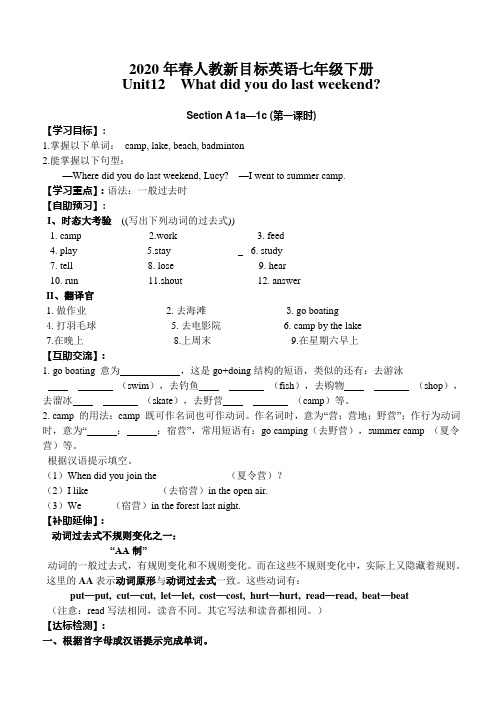
2020年春人教新目标英语七年级下册Unit12 What did you do last weekend?Section A 1a—1c (第一课时)【学习目标】:1.掌握以下单词:camp, lake, beach, badminton2.能掌握以下句型:—Where did you do last weekend, Lucy? —I went to summer camp.【学习重点】:语法:一般过去时【自助预习】:I、时态大考验((写出下列动词的过去式))1. camp____________2.work_______________3. feed_______________4. play ____________5.stay _____________6. study ______________7. tell _____________ 8. lose _______________ 9. hear_______________10. run ____________ 11.shout______________ 12. answer_____________II、翻译官1. 做作业________________2. 去海滩________________3. go boating___________________4. 打羽毛球_____________5. 去电影院 ____________6. camp by the lake_______________7.在晚上________________ 8.上周末______________ 9.在星期六早上_________________ 【互助交流】:1.go boating 意为,这是go+doing结构的短语,类似的还有:去游泳(swim),去钓鱼(fish),去购物(shop),去溜冰(skate),去野营(camp)等。
2018年秋人教版九年级英语(广东)作业:Unit12 Section A 基础导学

①用于肯定句时,主句中的谓语动词用延续性或状态动词,表示该动作或状 态一直延续到till/until所表示的时间为止。 eg:They waited here till/until ten o‘clock.他们在这儿一直等到10点钟。 (介词) She watched TV till/until her mother came back.她看电视直到她母亲回来。 (看电视的动作延续到母亲回来才结束)(连词)
【重点短语】 1.give sb. a lift捎某人一程 2.sell out卖光 3.be full of充满 4.be about to do刚要;正打算 5.go off发出响声 6.in disbelief怀疑的;不相信 7.think to oneself盘算;心中想 8.show up赶到;露面 9.rush out冲出;突然出现 10.by the time...在……以前 11.stare at盯着……看 12.in line with与……成一排 13.by the end of在(某时间点)以前
4.The other planes were full so I had to wait till the next day. 其他的航班都已经满员,因此我不得不等到第二天。 【解惑】till(=until)意为“到;直到”。此处用作介词,后接名词或名 词短语;也可用作连词,后接时间状语从句。其用法与until的用法基本相 同,可用于肯定句或否定句中。具体用法为:
(人教版)七年级下英语导学案:Unit 12 What did you do last

Unit 12 What did you do last weekend?Period 1Section A(1a~2d)自主学习课前诊断温故知新Ⅰ。
Dialogue:A: What do you usually do on weekends?B: I usually …Ⅱ. 汉译英1. 去看电影______________2. 去划船_______________3. 去海滩________________4. 去湖边野营___________5. 打羽毛球______________6. 去农场_______________7. 喂一些羊______________ 8. 看望我的祖母_________9. 为数学考试而学习________ 10. 在星期日晚上_________二.设问导读Ⅰ. Talk about what you did last weekend. Match the activities with the pictures (1a). Ⅱ. Listening (1b).Ⅲ. Role-play (1c).A: What did you do last weekend?B: On Saturday morning I played badminton.Ⅳ. Listening (2a, 2b).自我检测根据汉语意思完成句子,每空一词1. 你的周末怎么样?______ was your ______?2. 昨天我和我的同学去湖边野营。
I ______ ______ the lake with my _______ _______.3. 我去了农场并且喂了一些牛。
I went to a ______, and I ____some _____.4. 我呆在家,为英语考试而学习。
I _____ at home and _____ _____the English _____.互动学习问题解决辨析: bring, take, carry, fetchbring 意为“_____________”,表示“拿到靠说话人近的地方”。
新目标七年级下unit12 what did you do last weekend 导学案 (1)

I、预习交流
1.根据单元标题和图片等,预测新课内容;
2.根据音标拼读单词并牢记;
3.自学课文,勾画出重点和疑惑。
II、翻译官
1.做作业_______________2.去海滩________________
3.go boating___________ 4.打羽毛球_________________
__________________________________________________
五、练评(包含“考点链接”应用探究 6分钟)
I、精挑细选
( ) 1.-- Did you have a ___________ at school last week?
-- Yes, we did. I got an A.A.testB.lookC.walk
2. Finish1a, then check the answers.
3. Look at the conversation, and learn the drills:
-- What did you do last weekend?
-- Well, on Saturday morning, I played badminton.
Step3 Listening
1. Go through the sentences in2a.
2.Listento2aand underline the words you hear.
3.Listen again. Write C for Carol, J for Jack or B for Becky next to the statements in2b.Then check the answers.
(完整版)人教新目标九年级英语Unit12SectionA(1a-2d)教案
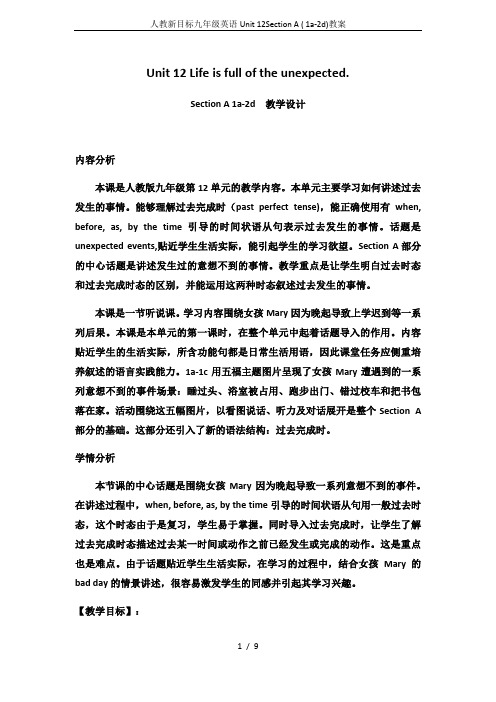
Unit 12 Life is full of the unexpected.Section A 1a-2d 教学设计内容分析本课是人教版九年级第12单元的教学内容。
本单元主要学习如何讲述过去发生的事情。
能够理解过去完成时(past perfect tense),能正确使用有when, before, as, by the time引导的时间状语从句表示过去发生的事情。
话题是unexpected events,贴近学生生活实际,能引起学生的学习欲望。
Section A部分的中心话题是讲述发生过的意想不到的事情。
教学重点是让学生明白过去时态和过去完成时态的区别,并能运用这两种时态叙述过去发生的事情。
本课是一节听说课。
学习内容围绕女孩Mary因为晚起导致上学迟到等一系列后果。
本课是本单元的第一课时,在整个单元中起着话题导入的作用。
内容贴近学生的生活实际,所含功能句都是日常生活用语,因此课堂任务应侧重培养叙述的语言实践能力。
1a-1c用五福主题图片呈现了女孩Mary遭遇到的一系列意想不到的事件场景:睡过头、浴室被占用、跑步出门、错过校车和把书包落在家。
活动围绕这五幅图片,以看图说话、听力及对话展开是整个Section A 部分的基础。
这部分还引入了新的语法结构:过去完成时。
学情分析本节课的中心话题是围绕女孩Mary因为晚起导致一系列意想不到的事件。
在讲述过程中,when, before, as, by the time引导的时间状语从句用一般过去时态,这个时态由于是复习,学生易于掌握。
同时导入过去完成时,让学生了解过去完成时态描述过去某一时间或动作之前已经发生或完成的动作。
这是重点也是难点。
由于话题贴近学生生活实际,在学习的过程中,结合女孩Mary 的bad day的情景讲述,很容易激发学生的同感并引起其学习兴趣。
【教学目标】:1. 语言知识目标:(1)学生能掌握以下单词及短语:unexpected, by the time, backpack, oversleep, ring, give …a lift,(2)学生能够掌握过去完成时的结构和用法。
人教版英语九全Unit12SectionA(3a3c)赛课教学设计
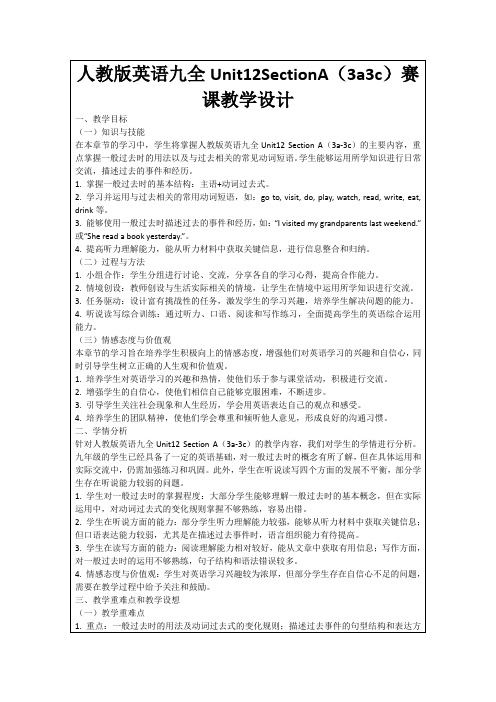
一、教学目标
(一)知识与技能
在本章节的学习中,学生将掌握人教版英语九全Unit12 Section A(3a-3c)的主要内容,重点掌握一般过去时的用法以及与过去相关的常见动词短语。学生能够运用所学知识进行日常交流,描述过去的事件和经历。
(二)教学设想
为了有效突破教学重难点,提高学生的英语综合运用能力,我设定以下教学设想:
1.创设情境,激发兴趣
利用多媒体手段,展示与过去事件相关的图片、视频等,激发学生的学习兴趣。通过情境创设,让学生在真实语境中感受一般过去时的用法,为后续的学习和交流打下基础。
2.任务驱动,分层教学
设计不同难度的任务,针对不同水平的学生进行分层教学。基础较好的学生可承担更具挑战性的任务,如编写小故事、进行角色扮演等;基础较弱的学生则从简单的句子开始,逐步提高要求。
4.情感态度与价值观:学生对英语学习兴趣较为浓厚,但部分学生存在自信心不足的问题,需要在教学过程中给予关注和鼓励。
三、教学重难点和教学设想
(一)教学重难点
1.重点:一般过去时的用法及动词过去式的变化规则;描述过去事件的句型结构和表达方式。
2.难点:熟练运用一般过去时进行交流;在具体情境中,准确、自然地描述过去的事件和经历。
3.教师巡回指导,解答学生在讨论过程中遇到的问题,引导学生正确使用一般过去时。
(四)课堂练习
1.教师设计不同形式的练习题,如:填空、选择、改写句子等,让学生在课堂上即时巩固所学知识。
2.安排角色扮演活动,让学生模拟真实场景,用一般过去时进行交流,提高学生的口语表达能力。
3.针对学生的练习情况,教师给予及时反馈,纠正错误,强化正确用法。
人教版七年级英语下册 Unit12 Section(A·GF-B·1e)预习-训练案

预习案 训练案
目录导航 学习目标
思考探究
课前预习 及时训练
学习目标
1.掌握一般过去时,不规则动词的过 去式;
2.能正确使用一般过去时的特殊疑问 句询问信息。
一、必背单词
课前预习
名词 1.语言__l_a_n_g_u_a_g_e____
三、动词过去式不规则变化之二:
d→tbuild →built
→oughtbuy→ bought
catch→caught
eep→eptkeep →kept
send→
bring→ ___b_ro_u__g_h_t ___
sleep→
___s_e_n_t______ think→
teach→ ____s_le_p_t_____
spend→ ___t_h_o_u_g_h_t___ ___t_a_u_g_h_t____ sweep→
___sp_e_n_t______ fight→
____s_w_e_p_t____
___fo_u_g_h_t_____
四、It is+形容词+(for sb.)to do sth.句型的用法 “It is+形容词+(for sb.)to do sth.”意为 “1.___对__某__人__来__说__做__某__事__…__…___”,it 作句子的形式主语,真 正的主语为后面的不定式。 2.学习英语是很重要的。 __I_t_i_s_______ very important _____to__le_a_r_n__________ English.
三、阅读理解。
Notice to Visit the Palace Museum
八年级英语上册导学案Unit_12_What’s_the_best_radio_stationSection_A

Unit 12 What’s the best radio station?Section A一、学习目标:1、熟悉本节出现的重要词汇2、Target language.①复习adj.and adv.比较级用法。
②学习adj.and adv.最高级用法。
3、think about\think over\think of用法。
4、to do作后置定语二、教学重点、难点adj.and adv.最高级用法。
三、知识链接adj.and adv.比较级用法。
四、学法指导:讲授法、交际法、归类法、听说法五、导学过程一)预习课本Pages71—73页,找出下列词组和句子。
(1)最好的无线电台_____ _(2)要去看电影的电影院_____ ___ (3)离家很近____ (4)在城里好玩的地方______(5)离家最近_______________ _ (6)最大的屏幕______________(7)最受欢迎的_ (8)最友好的服务______ __ (9)最舒适的座位__ (10)最好的电影院__ _____ (11)最好的服装店__________ (12)在城里_____ (13)有质量好的服装(14)有城里质量最差的服装(15)为什么你这样认为?____________ (16)非常差(17)最差的音乐________(18)考虑,认为(19)城里的地方(20)做……的调查(21)这是我们所了解的内容。
__________ (22)所有的电影院(23)相当差的服务(24)至于无线电台(25)播放最有趣的音乐_________________________________(26)三个要去吃午饭的地方_______________________(27)决定__________ (28)最好的吃午饭的地方二)掌握下列知识点1、复习adj.and adv.比较级用法。
2、学习adj.and adv.最高级用法。
人教版英语九全Unit 12 Section A(1a-3c)表格教学教案
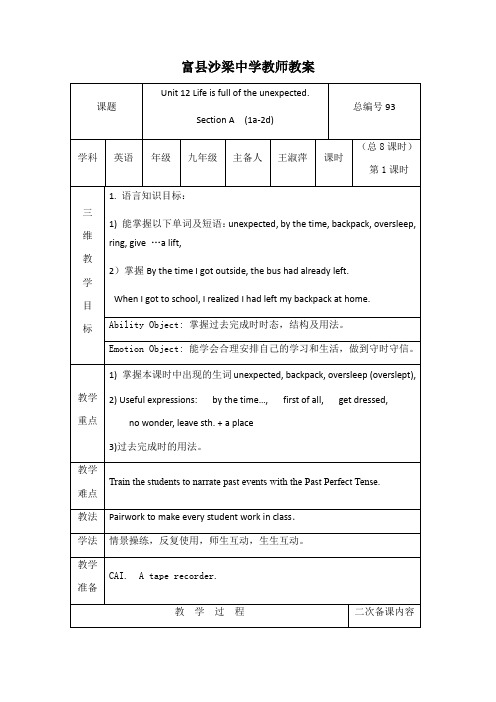
富县沙梁中学教师教案
课题
Unit 12 Life is full of the unexpected. Section A (1a-2d)
总编号 93
学科
英语
年级
九年级 主备人 王淑萍
(总 8 课时) 课时
第 1 课时
1. 语言知识目标:
三 1) 能掌握以下单词及短语:unexpected, by the time, backpack, oversleep,
Mary overslept in the morning. She wanted to go to the bathroom, but her brother had already gotten in the shower. When she got to the bus stop, the bus had already left. She had to run to school. After she got to school, she realized she had left her backpack at home. The sentences can vary, but should be correct.
Step 2 Presentation
1.Ask the students to discuss these questions in a group.
What do you usually do in the morning before school?
2.Ask the students to pay attention to the pictures in activity 1a. Ask students to tell what they see.
- 1、下载文档前请自行甄别文档内容的完整性,平台不提供额外的编辑、内容补充、找答案等附加服务。
- 2、"仅部分预览"的文档,不可在线预览部分如存在完整性等问题,可反馈申请退款(可完整预览的文档不适用该条件!)。
- 3、如文档侵犯您的权益,请联系客服反馈,我们会尽快为您处理(人工客服工作时间:9:00-18:30)。
Unit12 My favorite subject is science. 导学案
教师寄语:Never too old to learn.
Section A 课前预习
[学习目标] 1、熟练掌握表示科目的词汇。
2、学会讨论喜爱的科目。
3、了解由why, who 所引导的特殊疑问句。
[预习过程]
一.通过预习,认真填写下列单词、短语及句子。
1、单词:A、名词:学科,科目科学描述
字,词,话伙伴,合作者
B、疑问副词:为什么
C、连词:因为
D、疑问代词:谁
E、写出你所知道的学科名称:
2、短语:我最喜欢的科目
他的数学老师
最喜欢的城市
你朋友最喜欢的颜色
3、句子:你最喜欢的科目是什么?
我最喜欢的科目是体育。
你为什么喜欢体育?
因为它是有趣的。
你的语文老师是谁?
你妈妈最喜欢的颜色是什么?
一.1、(1a)理解单词的意思,并把单词与图片匹配,然后用所给的单词练习对话1c。
2、(3a)用方框中的单词完成对话,有的可以使用两次。
一、知识点讲解:
1、What’s your favorite subject? 你最喜欢的学科是什么?
1)favorite 作形容词,“最喜爱的”。
相当于“lik e…best”或“like…most”。
例:My favorite sport is basketball.=I like basketball best./ I like basketball most。
(同义句)
2)favorite 还可做名词,意为“特别喜欢的人或物”。
例:English is my favorite.
2、——Why do you like math?——Because it’s fun.你为什么喜欢数学?因为它是
有趣的。
Why 是疑问副词,意为“为什么”对原因提问,答语用“Because”引导的句子来回答。
另外why 表示“为什么”相当于“wha t…for”。
例如:Why do you go there? =What do you go there for?
3、Who is your science teacher? 谁是你的自然老师?
“who”为疑问代词,意为“谁”,对“人”来提问,在句中作主语、宾语或表语。
Who作主语通常认为是第三人称单数,句中的谓语动词要与其一致,且句子要用陈述语序。
例:Who is the first? Who is cleaning the window? Who are these women over there?
[预习自测题]
单项选择:
( ) 1. I like music best. My subject is music.
A. best
B. favorite
C. like
D. good
( ) 2. does she like music? —Because it’s very relaxing.
A. What
B. When
C. Why
D. Where
( ) 3. She doesn’t like math because it’s .
A. interesting
B. boring
C. beautiful
D. relaxing
调查:你了解你的好朋友吗?采访并且在表格中填写出你好朋友最喜欢的科目及原因。
然后报告你的采访结果!
Report: My good friend is….
His/Her favorite subject is …..
Because he/she thinks it’s …。
